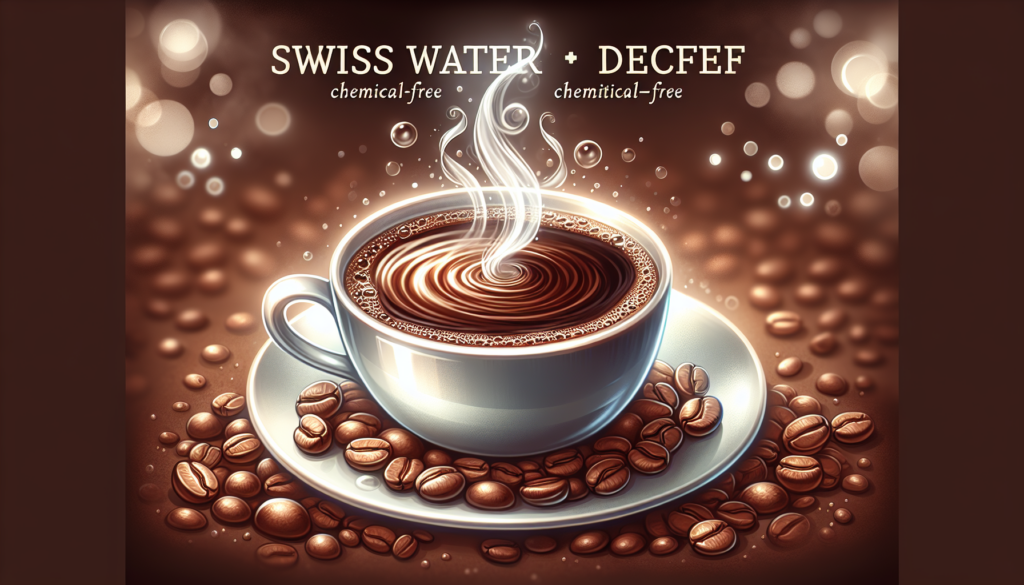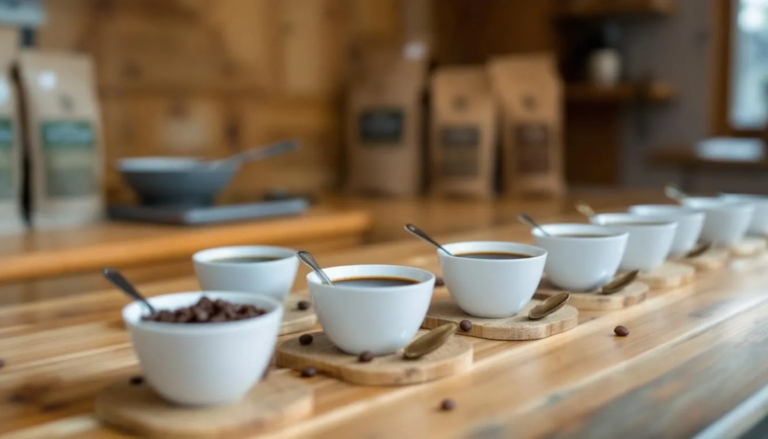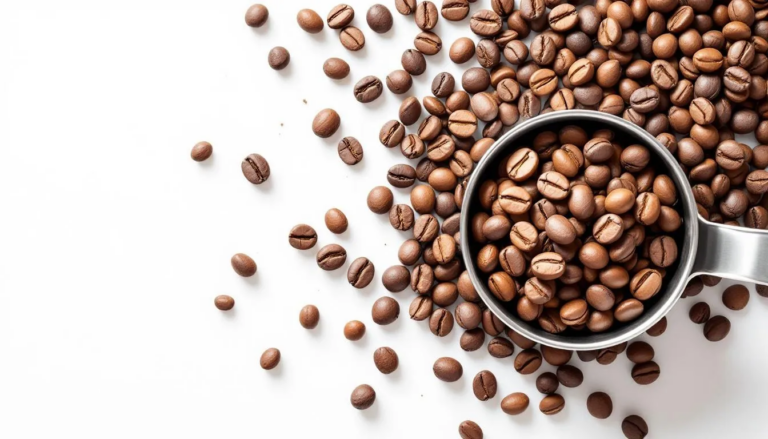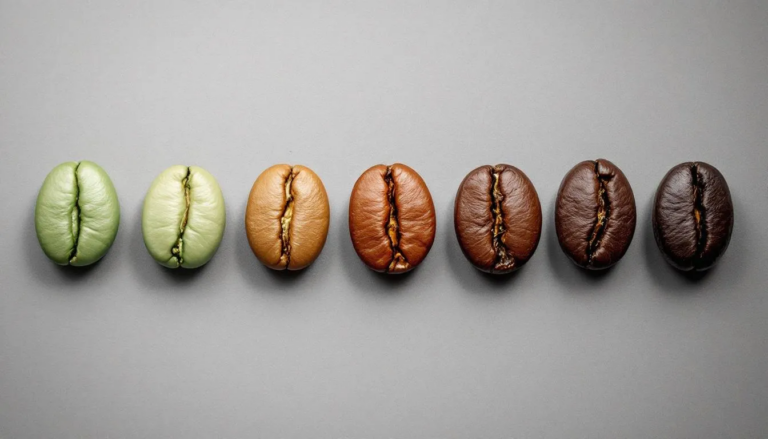Wondering what makes Swiss Water Process Decaf special? This method uses just water, temperature, and time to remove caffeine while keeping the coffee’s natural flavors intact. Read on to find out why it might be the best decaf option for you.
Key Takeaways
- Swiss Water Process Decaf uses only water, temperature, and time to remove caffeine, ensuring a chemical-free coffee experience.
- This method preserves the original flavor of the coffee beans, making Swiss Water Decaf taste remarkably similar to regular coffee.
- With a rich history and organic certification, Swiss Water Decaf is ideal for chocolate undertones and bold flavors, catering to health-conscious coffee lovers.
Swiss Water Process Decaf Coffee: A Smooth, Chemical-Free Choice
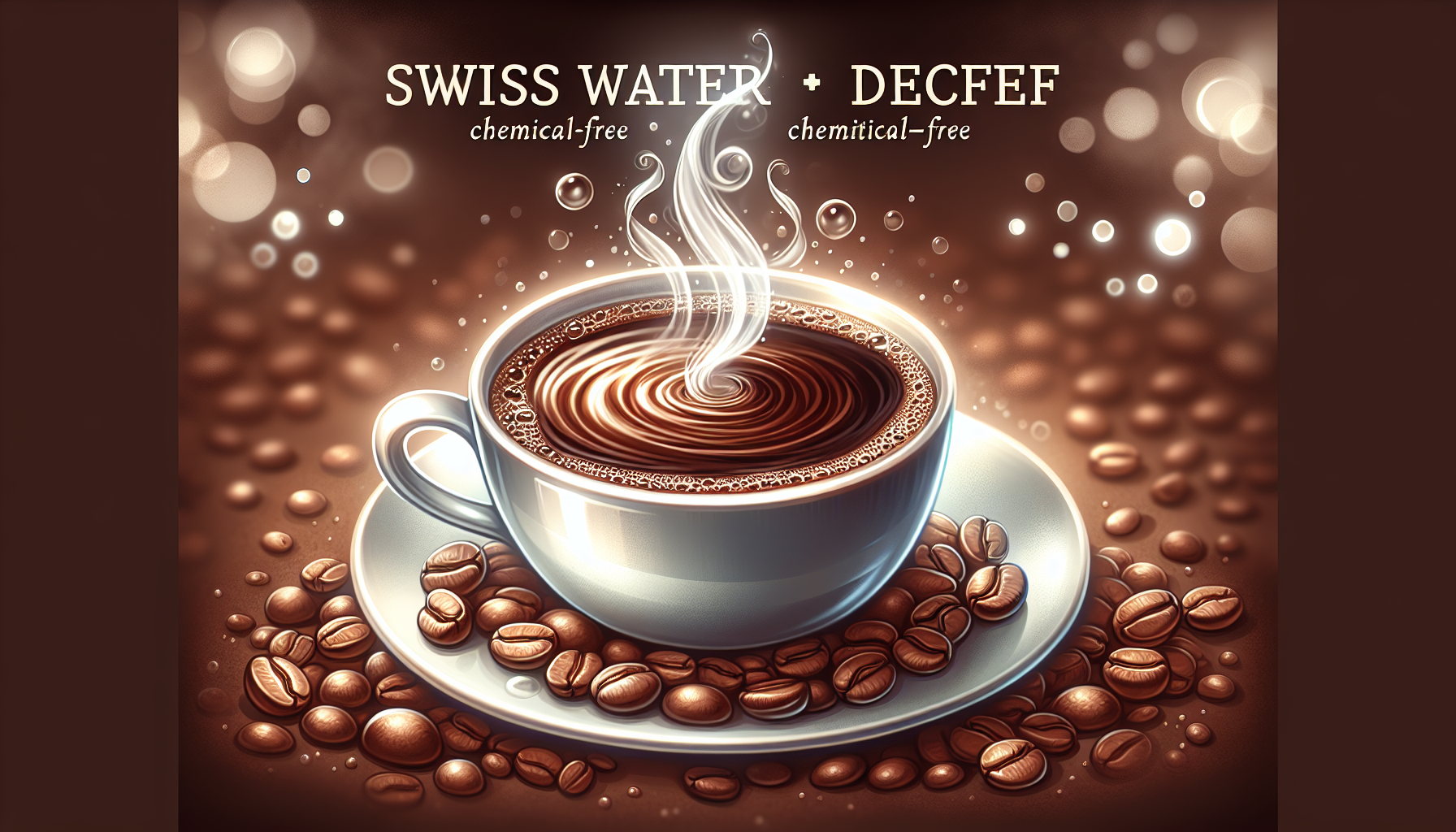
The allure of Swiss Water Process Decaf Coffee lies in its commitment to maintaining the natural integrity of coffee beans. Unlike other decaffeination processes that rely on chemical solvents, the Swiss Water Process uses only water, temperature, and time to remove caffeine while preserving the coffee’s natural flavors. This method ensures that the decaf coffee you enjoy is 100% chemical-free, making it a healthier choice for those who are conscious of what they consume.
What sets Swiss Water Process Decaf Coffee apart is its ability to deliver a smooth, rich taste that mirrors the original flavor of the coffee beans. The beans are soaked in water and green coffee extract, which removes caffeine through osmosis while retaining the original taste.
For coffee aficionados looking for a decaffeinated option that doesn’t compromise on flavor, Swiss Water Decaf is a clear winner.
Introduction
Coffee lovers often find themselves at a crossroads when it comes to decaf coffee. The thought of losing the robust, rich flavors they adore can be a significant deterrent. However, the Swiss Water Process offers a breakthrough, providing a chemical-free solution that keeps the essence of the coffee intact. This method not only preserves the flavor but also ensures that the coffee is free from any chemical residues, making it a smooth and enjoyable experience.
The Swiss Water Process is a game-changer for those who prefer to avoid caffeine but still want to indulge in a rich cup of great coffee made from whole bean. This pure water-based whole bean extraction method maintains the original flavor profile of the beans, resulting in a smooth and satisfying cup.
Whether you subscribe to the idea of drinking coffee for its taste or its ritual, the Swiss Water Process offers a compelling alternative to traditional decaffeination methods.
What is Swiss Water Process Decaf?
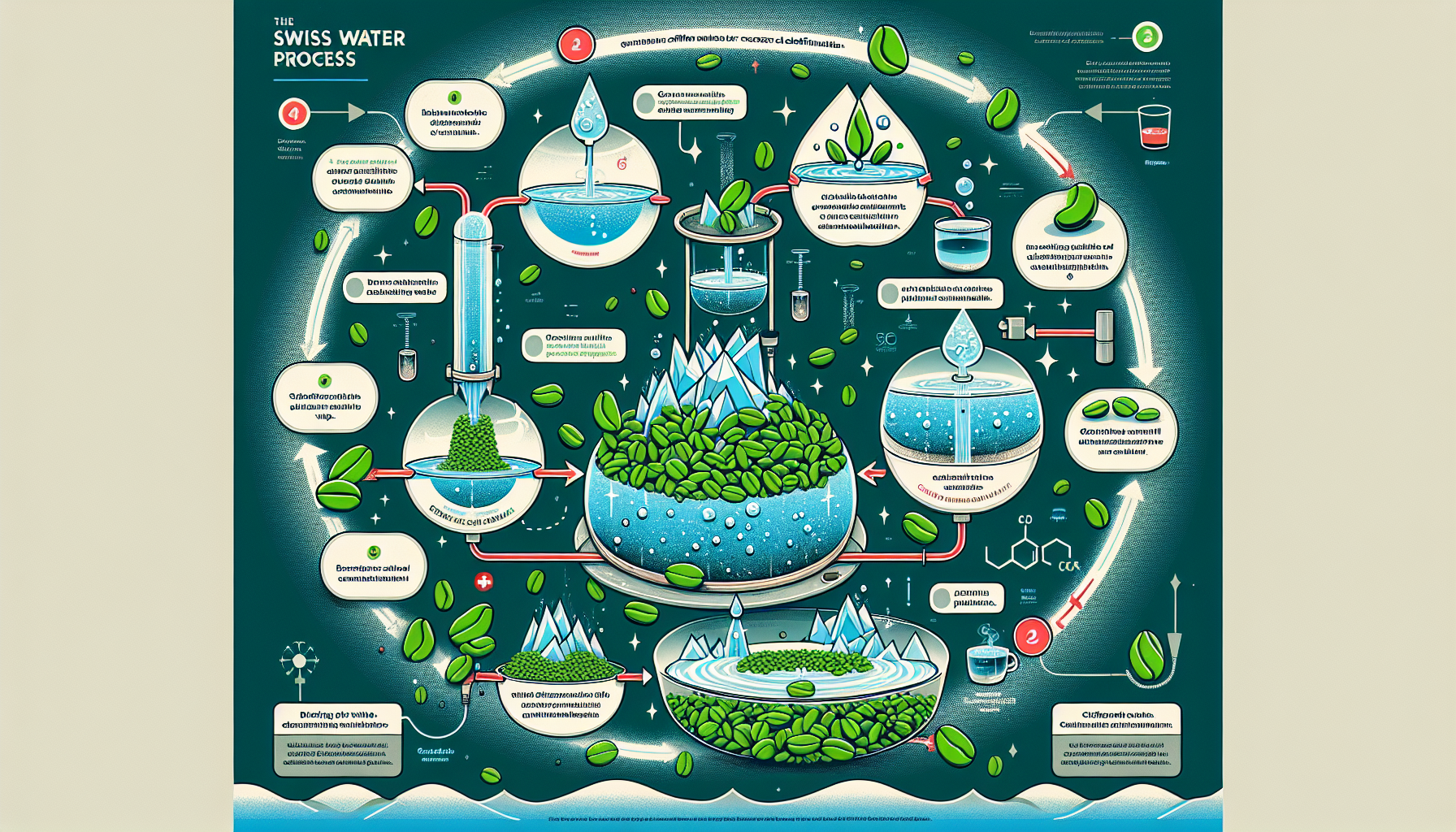
Swiss Water Process Decaf is a decaffeinated coffee that relies solely on water, temperature, and time to extract caffeine while preserving the natural flavors of the coffee. This method is certified organic, ensuring that no chemicals are used during the decaffeination and extraction process. The avoidance of harmful chemicals in the Swiss Water Process ensures a 100% chemical-free final product.
The process involves soaking green coffee beans in water and green coffee extract, which absorbs caffeine through osmosis. This allows the coffee to maintain its original flavor, providing a decaf option that doesn’t sacrifice taste.
Swiss Water Decaf provides a perfect balance of flavor and purity for those seeking the best coffee experience without caffeine.
History of the Swiss Water Process
The Swiss Water Process has a rich history that dates back to the 1930s in Schaffhausen, Switzerland. It was developed as a method to decaffeinate coffee without the use of chemicals, setting it apart from other methods that relied on solvents. Initially, the process faced challenges with batch inconsistency, but it gained commercial traction in the 1980s when a Canadian company began refining the method.
Significant improvements were made to the process in 2007, which led to more consistent production and better flavor retention. Today, the Swiss Water Process is celebrated among coffee enthusiasts for its ability to produce high-quality decaf coffee that preserves the original flavors of the beans.
How Swiss Water Process Works
The Swiss Water Process is a meticulous method that revolves around the careful use of water, temperature, and time to decaffeinate coffee. The key to this process is the creation of Green Coffee Extract (GCE), a solution containing water-soluble solids from coffee beans without caffeine. This extract plays a crucial role in removing caffeine while maintaining the coffee’s flavor profile.
The process begins by soaking green coffee beans in hot water to dissolve caffeine and other soluble substances. The temperature control is critical, typically operating around 200°F (93°C) for optimal caffeine extraction. The beans are then soaked for up to 10 hours to ensure that the caffeine is fully removed. A proprietary method is used to recycle the GCE, enhancing the efficiency of caffeine removal.
This detailed extraction process removes 99.94% of the caffeine, leaving only about 0.06% residual caffeine. This ensures that the decaf coffee retains its original flavors while being nearly caffeine-free.
Benefits of Swiss Water Decaf
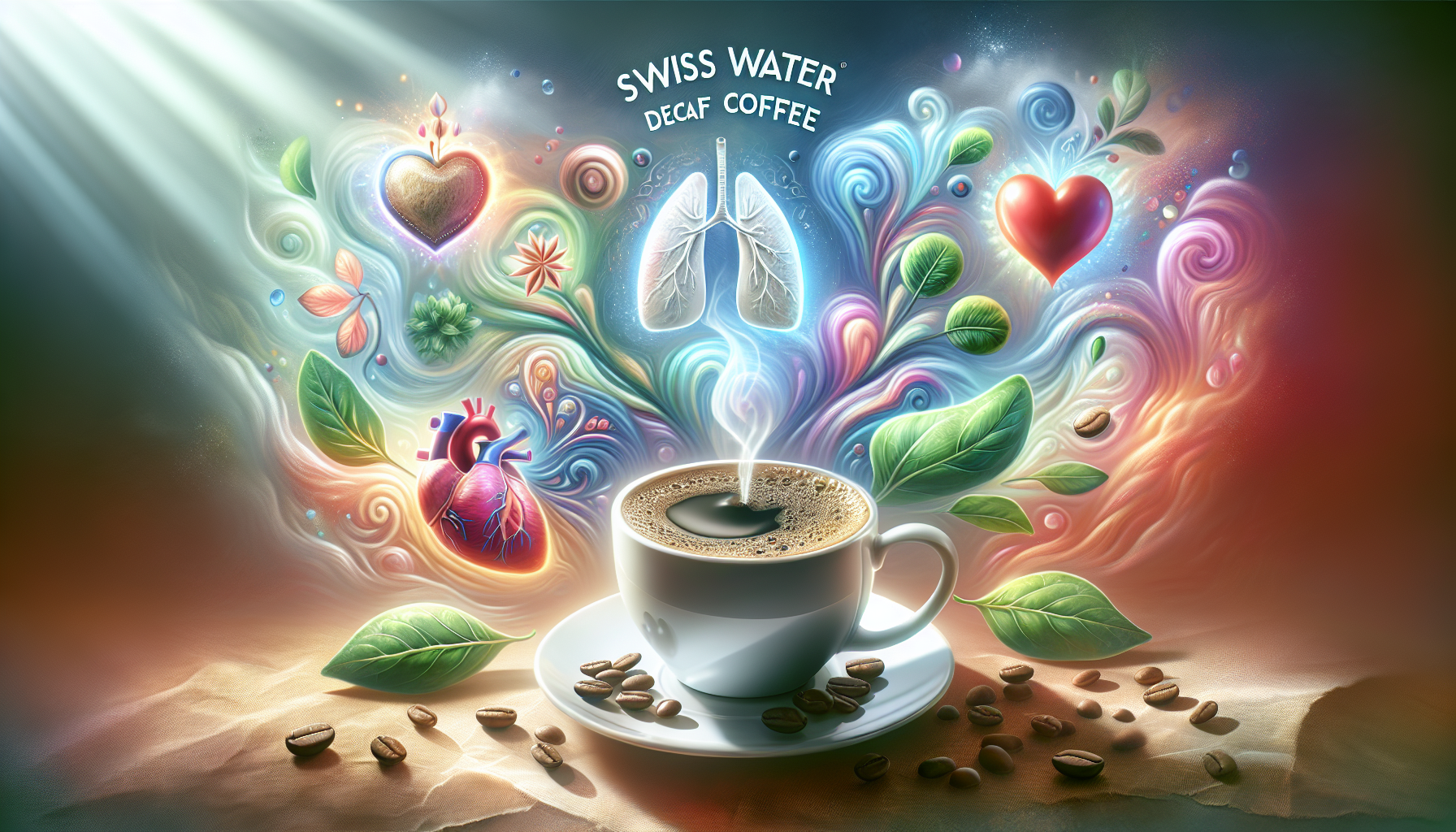
One of the standout benefits of Swiss Water Decaf coffee is its chemical-free nature. Unlike other decaffeination methods that use chemical solvents, the Swiss Water Process avoids these, making it a safer and more natural choice. This method supports environmentally-friendly practices, as it relies solely on water for decaffeination. This method is ideal for individuals with chemical sensitivities.
Another significant advantage is the preservation of the coffee’s authentic flavor profile. The Swiss Water Process maintains the natural characteristics of the coffee, allowing the original flavors and oils to shine through. This means that the decaf coffee tastes remarkably similar to regular coffee, satisfying even the most discerning palates.
Additionally, Swiss Water Decaf retains beneficial antioxidants, contributing to overall health without the exposure to harmful chemicals. Swiss Water Decaf provides a wholesome and flavorful experience for coffee lovers looking to enjoy their favorite beverage without caffeine.
Swiss Water vs. Other Decaffeination Methods
When comparing the Swiss Water Process to other decaffeination methods, the differences are striking. The Swiss Water Process relies on a natural, chemical-free approach that preserves the original flavor of the coffee beans. In contrast, chemical solvent methods use substances like Methyl Chloride and Ethyl Acetate, which can leave behind residual flavors and are not considered organic.
Another method worth mentioning is the Mountain Water Process, which also uses water to remove caffeine. While it shares similarities with the Swiss Water Process, the Mountain Water Process uses a unique blend of mountain spring water that can impart slightly different flavor characteristics.
Both methods are superior to chemical solvents, offering a more natural and flavorful decaf coffee option.
Chemical Solvent Methods
Chemical solvent methods are commonly used in the decaffeination process, particularly in the United States. Methyl Chloride, a colorless, flammable, and toxic chemical, is often employed to remove caffeine. This process removes about 94% of the caffeine, but it can lead to a residual processed flavor in the decaf coffee.
Products processed with Methyl Chloride are not considered organic due to the nature of the chemical used. The presence of such chemicals can be a drawback for consumers looking for a more natural coffee experience. Compared to the Swiss Water Process, chemical solvent methods fall short in both safety and flavor preservation.
Mountain Water Process
The Mountain Water Process is another water-based method for decaffeinating coffee. It uses a unique blend of mountain spring water, which contributes positively to the flavor profile of the decaffeinated coffee. This method shares the chemical-free advantage with the Swiss Water Process, providing a natural decaf option.
While the Mountain Water Process is similar to the Swiss Water Process, it is distinct in its use of pure mountain water, which can result in a slightly different taste. Both processes maintain the coffee’s original flavor without the use of harmful chemicals, making them excellent choices for those seeking a natural decaf coffee.
The Taste of Swiss Water Decaf
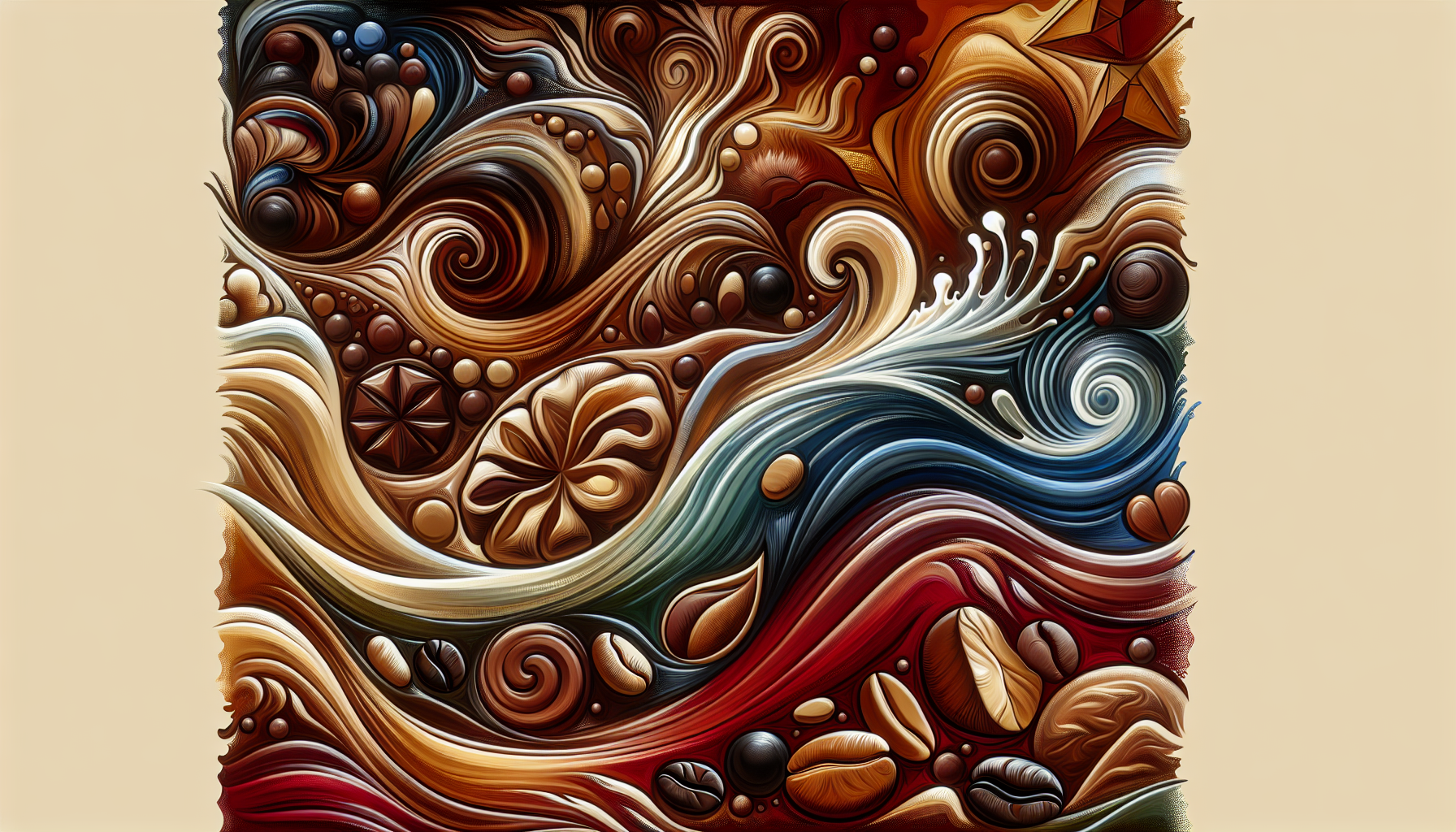
One of the most compelling reasons to choose Swiss Water Decaf is its exceptional taste. The process is renowned for its ability to preserve the original flavor characteristics of the coffee beans, ensuring that the decaf coffee tastes as close to regular coffee as possible. Medium roast coffee made with Swiss Water Process, for instance, delivers a bright aroma with light floral notes, making for a delightful drinking experience.
The taste of Swiss Water Process coffee is often described as quite good, with many consumers unable to distinguish it from caffeinated coffee. This robust flavor profile and the residual taste are a testament to the effectiveness of the Swiss Water Process in maintaining the integrity of the coffee’s original taste.
Popular Swiss Water Decaf Coffees
Several popular brands have embraced the Swiss Water Process to create exceptional decaf coffees. Decaf Colombia El Premio De Timana, for example, is celebrated for its rich, smooth flavor profile. Organic Decaf Espresso Bel Canto offers a well-balanced taste with chocolate undertones, perfect for espresso lovers.
Decaf Organic French Roast is perfect for those who prefer a bolder, smoky, robust flavor. Decaf Sumatra Lintong is known for its earthy and herbal notes and roasted well, providing a unique coffee experience. The Decaf Dancing Goats® Blend stands out with its vibrant and fruity characteristics, while Organic Decaf Peru is recognized for its bright acidity and sweet flavor.
Other notable mentions include the Beanery Blend Swiss Water® Process Decaf, which combines various beans for a complex flavor experience, and Espresso Perfecto® Swiss Water® Process Decaf, tailored for a rich crema. Rocking Chair Decaf Swiss Water® Process offers a smooth, comforting taste suitable for any time of day.
Brewing Tips for Swiss Water Decaf
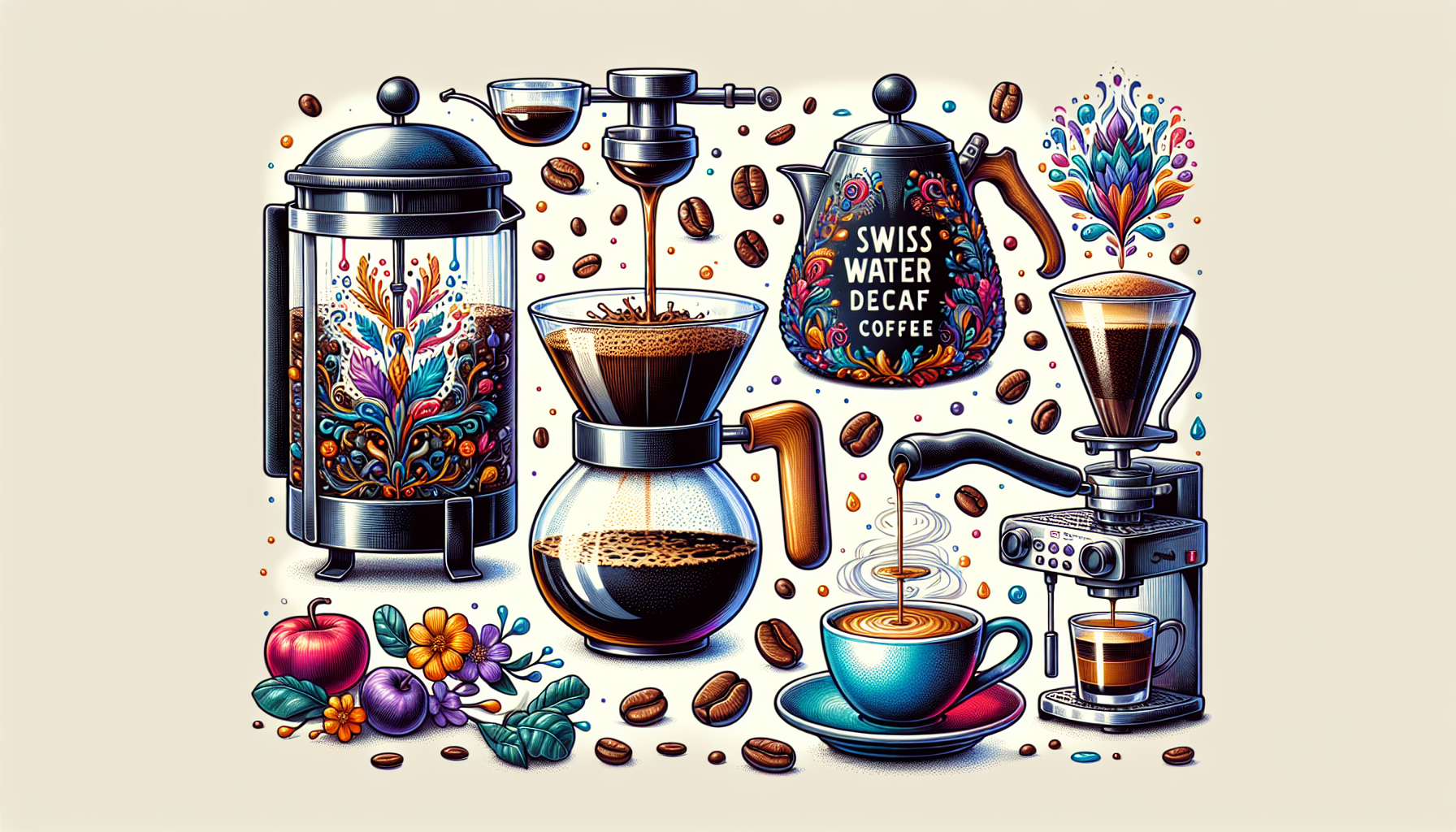
Brewing the perfect cup of Swiss Water Decaf requires attention to detail. Maintaining a precise water temperature between 195-205°F (90-96°C) is crucial for optimal flavor extraction. A recommended coffee-to-water ratio is 1:16, which helps balance the strength and richness of the brew.
Experimenting with brew times can also help you achieve the desired flavor profile in your cup of decaf coffee. Grinding the ground coffee beans to a medium-coarse consistency allows for even extraction and a more flavorful cup.
Serving your Swiss Water Decaf in a well-chosen mug can further enhance the overall coffee-drinking experience.
Is Swiss Water Decaf Right for You?
Swiss Water Decaf coffee is an excellent choice for those who want to enjoy their coffee without the negative effects of caffeine, such as jitters and sleep issues. It is especially beneficial for individuals with caffeine sensitivity, although some might still react to the trace amounts of caffeine present in the decaf coffee.
Coffee lovers often prefer Swiss Water Decaf for its ability to retain the original aroma and taste of the coffee beans, making it a favored choice among health-conscious consumers. If you seek a milder tasting coffee experience with lower acidity levels, Swiss Water Decaf might be the perfect fit for you.
Summary
In summary, Swiss Water Process Decaf Coffee offers a chemical-free, flavorful alternative to traditional decaf options. Its ability to preserve the natural flavors of the coffee beans while being environmentally friendly makes it a superior choice for coffee enthusiasts. Whether you’re looking to avoid caffeine or simply want to try a new decaf option, Swiss Water Decaf provides a rich, satisfying experience that’s hard to beat.
So, why not give Swiss Water Decaf a try? Indulge in the smooth, robust flavors without the caffeine kick and enjoy every sip of your favorite beverage, guilt-free.
Frequently Asked Questions
What makes Swiss Water Decaf different from other decaf coffees?
Swiss Water Decaf stands out because it relies solely on water, temperature, and time to decaffeinate the beans, making it a chemical-free option that retains great flavor. It’s a clean choice for those who want to savor their coffee without the caffeine jolt!
Is Swiss Water Decaf coffee organic?
Absolutely, Swiss Water Decaf coffee is organic since the process uses no chemicals. It’s a natural way to enjoy your coffee without the caffeine!
Does Swiss Water Decaf taste like regular coffee?
Absolutely! Swiss Water Decaf retains the original flavor characteristics of the coffee beans, so it tastes remarkably similar to regular coffee.
Who should consider drinking Swiss Water Decaf?
If you’re sensitive to caffeine or simply want a healthier, chemical-free coffee, Swiss Water Decaf is the perfect choice for you. Enjoy the rich flavor without the jitters!
How should I brew Swiss Water Decaf for the best taste?
To brew Swiss Water Decaf for the best taste, maintain a water temperature between 195-205°F, use a coffee-to-water ratio of 1:16, and grind your beans to a medium-coarse consistency. This will ensure optimal flavor extraction.
